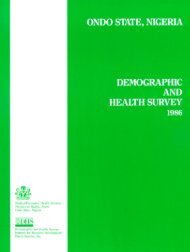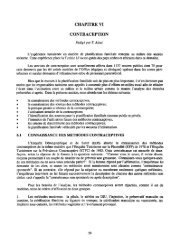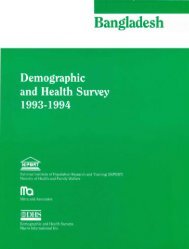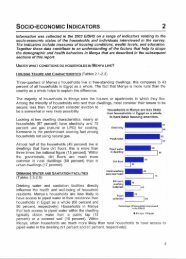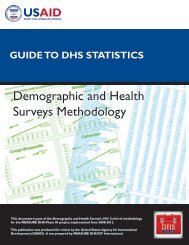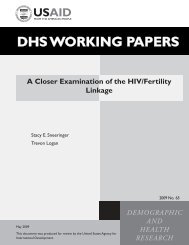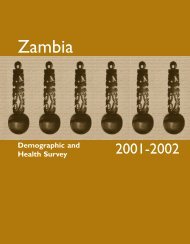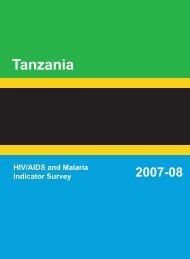- Page 1 and 2:
Ethiopia Demographic and Health Sur
- Page 3 and 4:
Ethiopia Demographic and Health Sur
- Page 5 and 6:
CONTENTS Page Tables and Figures ..
- Page 7 and 8:
CHAPTER 8 INFANT AND CHILD MORTALIT
- Page 9 and 10:
TABLES AND FIGURES Page CHAPTER 1 I
- Page 11 and 12:
Table 5.22 Women’s approval of fa
- Page 13 and 14:
Page CHAPTER 11 INFANT FEEDING AND
- Page 15:
FOREWORD The 2000 Ethiopia Demograp
- Page 19 and 20:
SUMMARY OF FINDINGS The 2000 Ethiop
- Page 21 and 22:
Twelve percent of children are full
- Page 23 and 24:
WOMEN’S STATUS The DHS data shed
- Page 25 and 26:
The majority of the population live
- Page 27 and 28:
Table 1.2 Results of the household
- Page 29 and 30:
Table 2.1 Household population by a
- Page 31 and 32:
Table 2.3 Children’s living arran
- Page 33 and 34:
An investigation of the changes in
- Page 35 and 36:
The age-specific attendance rates (
- Page 37 and 38:
ural than in urban households. The
- Page 39 and 40:
Table 2.11 Utilization and source o
- Page 41 and 42:
Table 3.1 Background characteristic
- Page 43 and 44:
Table 3.3 Educational attainment by
- Page 45 and 46:
Table 3.4 Literacy Percent distribu
- Page 47 and 48:
3.5 EMPLOYMENT Respondents were ask
- Page 49 and 50:
Table 3.6.2 Employment: men Percent
- Page 51 and 52:
Table 3.7.2 Occupation: men Percent
- Page 53 and 54:
Employment is assumed to go hand in
- Page 55 and 56:
Table 3.10 Women's agreement with r
- Page 57 and 58:
primary education. There is substan
- Page 59 and 60:
FERTILITY 4 Fertility is the most i
- Page 61 and 62:
4.2 FERTILITY DIFFERENTIALS Table 4
- Page 63 and 64:
4.4 CHILDREN EVER BORN AND LIVING T
- Page 65 and 66:
Comparison of these results with th
- Page 67 and 68:
Table 4.7 Age at first birth Percen
- Page 69 and 70:
FERTILITY REGULATION 5 Information
- Page 71 and 72:
Table 5.2 Couples’ knowledge of c
- Page 73 and 74:
Table 5.4 Ever use of contraception
- Page 75 and 76:
Table 5.5 Current use of contracept
- Page 77 and 78:
Table 5.6.1 Current use of contrace
- Page 79 and 80:
Table 5.6.2 Current use of contrace
- Page 81 and 82:
“Prudence” is used by 13 percen
- Page 83 and 84:
Table 5.12 Number of children at fi
- Page 85 and 86:
5.10 INTENTION TO USE FAMILY PLANNI
- Page 87 and 88:
The majority (46 percent) of women
- Page 89 and 90:
Education of respondents is closely
- Page 91 and 92:
To get an insight into the level of
- Page 93 and 94:
When there is a perceived disagreem
- Page 95 and 96: OTHER PROXIMATE DETERMINANTS OF FER
- Page 97 and 98: 6.2 POLYGYNY The extent of polygyny
- Page 99 and 100: Table 6.3 Age at first marriage Per
- Page 101 and 102: Table 6.5 Age at first sexual inter
- Page 103 and 104: Table 6.7 Recent sexual activity: w
- Page 105 and 106: ut had had sex before (Table 6.8).
- Page 107 and 108: FERTILITY PREFERENCE 7 Due to vario
- Page 109 and 110: Figure 7.2 Desire to Limit Childbea
- Page 111 and 112: Table 7.4 Desire to limit childbear
- Page 113 and 114: Table 7.5 Need for family planning
- Page 115 and 116: Table 7.6 also shows that the ideal
- Page 117 and 118: Table 7.9 shows wanted fertility ra
- Page 119 and 120: and deaths affects mortality estima
- Page 121 and 122: 8.3 SOCIOECONOMIC DIFFERENTIALS IN
- Page 123 and 124: 8.4 DEMOGRAPHIC DIFFERENTIALS IN MO
- Page 125 and 126: at any time during the five years b
- Page 127 and 128: Table 8.5 High-risk fertility behav
- Page 129 and 130: siblings with missing information f
- Page 131 and 132: Table 9.2 Direct estimates of mater
- Page 133 and 134: Table 10.1 Antenatal care Percent d
- Page 135 and 136: Table 10.3 Antenatal care content P
- Page 137 and 138: Affar Region. Education of the moth
- Page 139 and 140: Table 10.6 Place of delivery Percen
- Page 141 and 142: irths to women with no education. N
- Page 143 and 144: Table 10.9 Postnatal care by backgr
- Page 145: 10.10 EXPOSURE TO SUNLIGHT In some
- Page 149 and 150: Figure 10.2 Vaccination Coverage Am
- Page 151 and 152: Table 10.15 Vaccinations in first y
- Page 153 and 154: Only 16 percent of all children und
- Page 155 and 156: Very few children with fever are ta
- Page 157 and 158: 10.17 PREVALENCE OF DIARRHEA Diarrh
- Page 159 and 160: Table 10.23 Diarrhea treatment Amon
- Page 161 and 162: INFANT FEEDING AND CHILDHOOD AND MA
- Page 163 and 164: Information on supplementation was
- Page 165 and 166: The median and mean duration of bre
- Page 167 and 168: Table 11.5 Frequency of foods consu
- Page 169 and 170: Table 11.7 Iodized salt Percent dis
- Page 171 and 172: A mother’s nutritional status dur
- Page 173 and 174: e related to age and that weight be
- Page 175 and 176: Chronic malnutrition among Ethiopia
- Page 177 and 178: of 140 to 150 centimeters. The BMI,
- Page 179 and 180: Table 12.1 Knowledge of AIDS Percen
- Page 181 and 182: Table 12.2.2 Source of information
- Page 183 and 184: Table 12.4.1 Knowledge of programma
- Page 185 and 186: Table 12.5 Knowledge of HIV/AIDS-re
- Page 187 and 188: or partner than others. Discussion
- Page 189 and 190: Tables 12.9.1 and 12.9.2 show the k
- Page 191 and 192: Table 12.10 Self-reporting of sexua
- Page 193 and 194: Table 12.12 Number of sexual partne
- Page 195 and 196: Sexual intercourse with noncohabiti
- Page 197 and 198:
REFERENCES Boerma, J. Ties. 1988. M
- Page 199 and 200:
A.4 SAMPLING FRAME The Ethiopia DHS
- Page 201 and 202:
The Men’s Questionnaire collected
- Page 203 and 204:
Table A.1.1 Sample implementation:
- Page 205 and 206:
ESTIMATES OF SAMPLING ERRORS APPEND
- Page 207 and 208:
In general, the relative standard e
- Page 209 and 210:
Table B.2 Sampling errors: National
- Page 211:
Table B.4 Sampling errors: Rural sa
- Page 214 and 215:
Table C.2 Age distribution of eligi
- Page 216 and 217:
Table C.5 Reporting of age at death
- Page 218 and 219:
Table C.8 Indicators of data qualit
- Page 220 and 221:
Statisticians Abay Getachew Amanuel
- Page 222 and 223:
Female Interviewers (contd.) Rahel
- Page 224 and 225:
HOUSEHOLD SCHEDULE Now we would lik
- Page 226 and 227:
CURRENT SCHOOL ATTENDANCE IF AGE 5-
- Page 228 and 229:
PARENTAL SURVIVORSHIP AND RESIDENCE
- Page 230 and 231:
NO. QUESTIONS AND FILTERS CODING CA
- Page 232 and 233:
NO. QUESTIONS AND FILTERS CODING CA
- Page 234 and 235:
CENTRAL STATISTICAL AUTHORITY ETHIO
- Page 236 and 237:
NO. QUESTIONS AND FILTERS CODING CA
- Page 238 and 239:
211 Now I would like to record the
- Page 240 and 241:
NO. QUESTIONS AND FILTERS CODING CA
- Page 242 and 243:
NO. QUESTIONS AND FILTERS CODING CA
- Page 244 and 245:
NO. QUESTIONS AND FILTERS CODING CA
- Page 246 and 247:
NO. QUESTIONS AND FILTERS CODING CA
- Page 248 and 249:
LAST BIRTH NAME ___________________
- Page 250 and 251:
427 Was (NAME) delivered by caesari
- Page 252 and 253:
442 Are you still breastfeeding (NA
- Page 254 and 255:
SECTION 4B. IMMUNIZATION AND HEALTH
- Page 256 and 257:
463 Has (NAME) been ill with a feve
- Page 258 and 259:
479 Where did you seek advice or tr
- Page 260 and 261:
NO. QUESTIONS AND FILTERS CODING CA
- Page 262 and 263:
SECTION 6. FERTILITY PREFERENCES NO
- Page 264 and 265:
NO. QUESTIONS AND FILTERS CODING CA
- Page 266 and 267:
NO. QUESTIONS AND FILTERS CODING CA
- Page 268 and 269:
NO. QUESTIONS AND FILTERS CODING CA
- Page 270 and 271:
804 What was the name given to your
- Page 272 and 273:
SECTION 9: FEMALE CIRCUMCISION NO.
- Page 274 and 275:
NO. QUESTIONS AND FILTERS CODING CA
- Page 276 and 277:
SECTION 11. SEXUAL ACTIVITY NO. QUE
- Page 278 and 279:
INTERVIEWER’S OBSERVATIONS TO BE
- Page 280 and 281:
SECTION 1. RESPONDENT’S BACKGROUN
- Page 282 and 283:
SECTION 2: REPRODUCTION NO. QUESTIO
- Page 284 and 285:
NO. QUESTIONS AND FILTERS CODING CA
- Page 286 and 287:
SECTION 4. MARRIAGE NO. QUESTIONS A
- Page 288 and 289:
SECTION 5. FERTILITY PREFERENCES NO
- Page 290 and 291:
NO. QUESTIONS AND FILTERS CODING CA
- Page 292 and 293:
NO. QUESTIONS AND FILTERS CODING CA
- Page 294 and 295:
SECTION 7: AIDS AND OTHER SEXUALLY
- Page 296 and 297:
NO. QUESTIONS AND FILTERS CODING CA
- Page 298 and 299:
NO. QUESTIONS AND FILTERS CODING CA



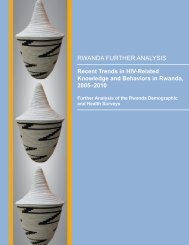
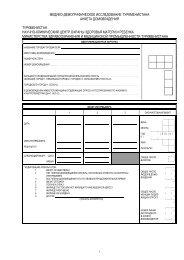
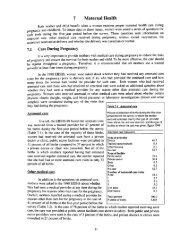


![Obtaining Informed Consent for HIV Testing [QRS4] - Measure DHS](https://img.yumpu.com/49850117/1/190x245/obtaining-informed-consent-for-hiv-testing-qrs4-measure-dhs.jpg?quality=85)
